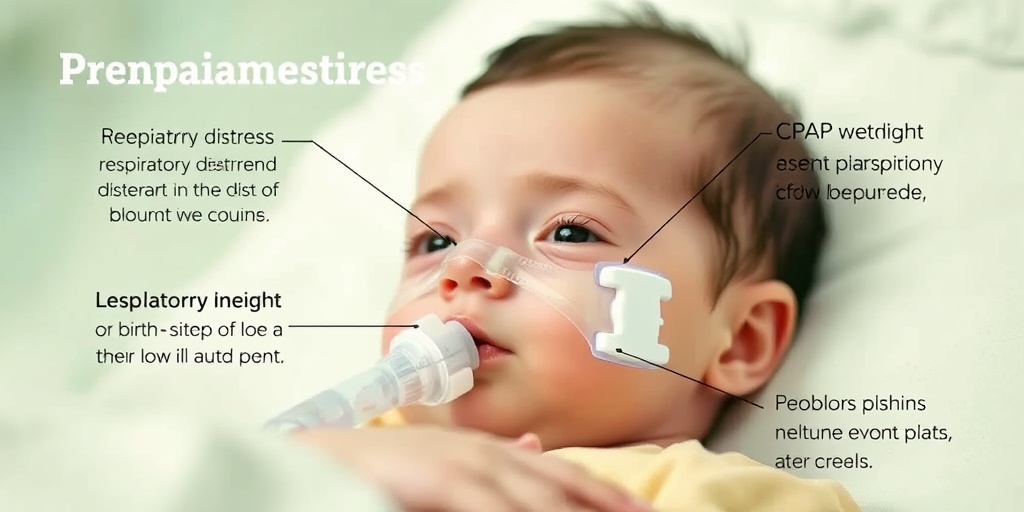What Is a Premature Infant?
A premature infant, often referred to as a preemie, is a baby born before the 37th week of pregnancy. To put this into perspective, a full-term pregnancy typically lasts about 40 weeks. Premature infants can be born as early as 24 weeks, and their early arrival can lead to a variety of health challenges. The earlier a baby is born, the more likely they are to face complications, as their organs may not be fully developed.
Understanding Prematurity
Prematurity is classified into three categories based on gestational age:
- Moderate to late preterm: Babies born between 32 and 36 weeks.
- Very preterm: Babies born before 32 weeks.
- Extremely preterm: Babies born before 28 weeks.
Each category presents its own set of challenges and risks. For instance, extremely preterm infants often require intensive medical care and monitoring in a neonatal intensive care unit (NICU).
Causes of Prematurity
There are several factors that can contribute to the birth of a premature infant, including:
- Multiple pregnancies: Carrying twins, triplets, or more increases the likelihood of premature birth.
- Infections: Certain infections can trigger early labor.
- Chronic health conditions: Conditions such as diabetes or high blood pressure can lead to complications.
- Previous preterm births: A history of premature births increases the risk for future pregnancies.
Understanding these factors can help expectant parents take preventive measures and seek appropriate care during pregnancy.
Premature Infant Symptoms
Identifying a premature infant can be crucial for ensuring they receive the necessary care. Here are some common symptoms and characteristics of premature infants:
Physical Characteristics
Premature infants often exhibit distinct physical traits that differentiate them from full-term babies:
- Low birth weight: Premature infants typically weigh less than 5.5 pounds (2.5 kg).
- Thin, fragile skin: Their skin may appear translucent and delicate.
- Underdeveloped organs: Organs such as the lungs and brain may not be fully matured, leading to potential complications.
- Weak muscle tone: Premature infants may have less muscle tone and appear floppy.
Behavioral Symptoms
In addition to physical characteristics, premature infants may also display specific behavioral symptoms:
- Difficulty feeding: Premature infants may struggle with breastfeeding or bottle-feeding due to underdeveloped sucking reflexes.
- Respiratory issues: Many preemies experience breathing difficulties, such as apnea (pauses in breathing).
- Temperature regulation problems: Premature infants often have difficulty maintaining their body temperature.
- Increased sensitivity: They may be more sensitive to light and sound, requiring a calm environment.
Importance of Early Intervention
Recognizing the symptoms of a premature infant is vital for timely intervention. Early medical care can significantly improve outcomes for preemies. Hospitals often have specialized NICUs equipped to provide the necessary support and treatment for these vulnerable infants.
For parents navigating the challenges of caring for a premature infant, resources like Yesil Health AI (yesilhealth.com) can offer valuable, evidence-based information and support. Understanding the complexities of premature infant care can empower parents to make informed decisions and advocate for their child’s health.
In conclusion, being aware of what constitutes a premature infant and recognizing the symptoms can help ensure that these little fighters receive the care they need. With advancements in medical technology and increased awareness, many premature infants go on to lead healthy lives. 🌟

Causes of Premature Birth
Understanding the causes of premature birth is crucial for parents and healthcare providers alike. A premature infant is defined as a baby born before 37 weeks of gestation, compared to the typical 40 weeks. The reasons behind premature births can be complex and multifaceted. Here are some of the primary causes:
1. Multiple Pregnancies
Carrying more than one baby, such as twins or triplets, significantly increases the likelihood of premature birth. The body may not be able to support multiple fetuses for the full term, leading to early delivery.
2. Infections and Chronic Conditions
Infections in the mother, particularly of the urinary tract or amniotic fluid, can trigger premature labor. Additionally, chronic health issues like diabetes, high blood pressure, or autoimmune disorders can also contribute to the risk of having a premature infant.
3. Uterine or Cervical Problems
Structural issues with the uterus or cervix, such as an incompetent cervix or uterine abnormalities, can lead to premature labor. These conditions may prevent the uterus from holding the baby until full term.
4. Lifestyle Factors
Certain lifestyle choices can increase the risk of premature birth. These include:
- Smoking: Tobacco use during pregnancy is linked to a higher risk of preterm labor.
- Alcohol and Drug Use: Substance abuse can adversely affect fetal development and lead to early delivery.
- Poor Nutrition: Inadequate prenatal nutrition can impact the health of both the mother and the baby.
5. Stress and Emotional Factors
High levels of stress, whether from personal circumstances or work-related issues, can negatively affect pregnancy. Emotional well-being is essential for a healthy pregnancy, and chronic stress may lead to complications, including premature birth.
6. Previous Preterm Births
If a woman has had a previous premature infant, she is at a higher risk of experiencing another premature birth in subsequent pregnancies. This history can be a significant factor in prenatal care planning.
Risk Factors for Premature Infants
Identifying risk factors for premature infants is vital for prevention and early intervention. While some factors are beyond control, understanding them can help expectant mothers take proactive steps to ensure a healthier pregnancy.
1. Maternal Age
Women under 17 or over 35 years of age are at a higher risk of having a premature infant. Younger mothers may not have fully developed bodies for pregnancy, while older mothers may face complications related to age.
2. Low Socioeconomic Status
Access to healthcare, nutrition, and education can significantly impact pregnancy outcomes. Women from lower socioeconomic backgrounds may face barriers that increase their risk of premature birth.
3. Lack of Prenatal Care
Regular prenatal visits are essential for monitoring the health of both mother and baby. Women who do not receive adequate prenatal care are at a higher risk of complications, including premature labor.
4. Previous Pregnancy Complications
Women who have experienced complications in previous pregnancies, such as gestational diabetes or preeclampsia, may be at increased risk for premature birth in future pregnancies.
5. Physical Health Issues
Conditions such as obesity, high blood pressure, and diabetes can complicate pregnancy and increase the likelihood of delivering a premature infant. Managing these health issues before and during pregnancy is crucial.
6. Environmental Factors
Exposure to environmental toxins, such as pollution or hazardous chemicals, can negatively impact pregnancy outcomes. Pregnant women should be mindful of their surroundings and take steps to minimize exposure to harmful substances.
By understanding the causes and risk factors associated with premature birth, expectant mothers can work closely with their healthcare providers to develop a plan that promotes a healthy pregnancy and reduces the likelihood of delivering a premature infant. 🌼

Diagnosis of Prematurity
Diagnosing prematurity is a crucial step in ensuring that premature infants receive the appropriate care and support they need. Prematurity is defined as being born before 37 weeks of gestation, with full-term pregnancies typically lasting around 40 weeks. Understanding the signs and methods used to diagnose prematurity can help parents and healthcare providers take timely action.
Signs of Prematurity
There are several indicators that a baby may be premature. Some common signs include:
- Low Birth Weight: Premature infants often weigh less than 5.5 pounds (2,500 grams) at birth.
- Physical Appearance: Premature babies may have a thinner, more fragile appearance, with less body fat and a smaller head circumference.
- Respiratory Issues: Difficulty breathing or irregular breathing patterns can be a sign of prematurity.
- Temperature Regulation: Premature infants may struggle to maintain their body temperature due to insufficient body fat.
Diagnostic Methods
Healthcare providers use various methods to diagnose prematurity, including:
- Ultrasound: This imaging technique can help assess the baby’s growth and development during pregnancy.
- Fetal Monitoring: Continuous monitoring of the baby’s heart rate can provide insights into their well-being.
- Physical Examination: After birth, a thorough physical examination can help determine if the infant is premature based on their physical characteristics.
In some cases, healthcare providers may also consider the mother’s health history and any complications during pregnancy that could lead to premature birth. Early diagnosis is essential for implementing the right care strategies for premature infants and improving their chances of healthy development.
Care for Premature Infants
Caring for premature infants requires specialized knowledge and attention to their unique needs. These infants are at a higher risk for various health issues, making it essential for caregivers to be well-informed about the best practices in their care.
Neonatal Intensive Care Unit (NICU)
Most premature infants are admitted to a Neonatal Intensive Care Unit (NICU) immediately after birth. The NICU is equipped with advanced technology and staffed by healthcare professionals trained to care for vulnerable newborns. Here are some key aspects of NICU care:
- Monitoring: Continuous monitoring of vital signs, including heart rate, breathing, and temperature, is crucial.
- Feeding: Premature infants may require specialized formulas or feeding methods, such as tube feeding, until they can feed orally.
- Temperature Control: Incubators or warming beds help maintain the infant’s body temperature.
Feeding and Nutrition
Nutrition is vital for the growth and development of premature infants. Breast milk is often recommended due to its numerous benefits, including:
- Rich in Nutrients: Breast milk contains essential nutrients that support the infant’s growth.
- Immune Support: It provides antibodies that help protect against infections.
- Customized Nutrition: The composition of breast milk can adapt to the changing needs of the growing infant.
If breastfeeding is not possible, healthcare providers may recommend premature infant formula designed to meet the specific nutritional needs of these babies.
Managing Pain and Discomfort
Premature infants may experience pain and discomfort due to various medical procedures or conditions. Understanding the premature infant pain profile is essential for effective management. Here are some strategies:
- Gentle Touch: Skin-to-skin contact, also known as kangaroo care, can provide comfort and promote bonding.
- Minimizing Stress: Creating a calm environment with reduced noise and light can help soothe the infant.
- Medications: In some cases, healthcare providers may prescribe medications to manage pain effectively.
Overall, caring for premature infants involves a comprehensive approach that addresses their medical, nutritional, and emotional needs. By understanding the unique challenges they face, caregivers can provide the best possible support for these vulnerable little ones. 🌟

Long-Term Effects of Prematurity
Being born a premature infant—defined as being born before 37 weeks of gestation—can lead to a variety of long-term effects that may impact a child’s development and health. Understanding these potential outcomes is crucial for parents, caregivers, and healthcare providers.
Physical Health Challenges
Premature infants often face several physical health challenges as they grow. Some of the most common long-term effects include:
- Respiratory Issues: Many premature infants experience chronic lung disease, which can lead to ongoing respiratory problems.
- Vision Problems: Conditions such as retinopathy of prematurity (ROP) can affect vision, potentially leading to blindness in severe cases.
- Hearing Impairments: Hearing loss is more prevalent among premature infants, necessitating regular hearing screenings.
Developmental Delays
In addition to physical health challenges, premature infants may experience developmental delays. These can manifest in various ways:
- Cognitive Delays: Some children may have difficulties with learning and memory, impacting their academic performance.
- Motor Skill Delays: Premature infants might take longer to reach milestones such as crawling, walking, and fine motor skills.
- Social and Emotional Challenges: These children may struggle with social interactions and emotional regulation, leading to potential behavioral issues.
Psychosocial Implications
The journey of a premature infant doesn’t just affect their physical and cognitive development; it can also have psychosocial implications. Parents and families may experience:
- Increased Stress: The uncertainty surrounding a premature infant’s health can lead to heightened stress and anxiety for parents.
- Financial Strain: The medical costs associated with premature birth can be significant, impacting family finances.
- Social Isolation: Families may feel isolated due to the unique challenges they face, which can affect their support networks.
Support for Parents of Premature Infants
Supporting parents of premature infants is essential for their well-being and the health of their child. Here are some effective ways to provide support:
Emotional Support
Emotional support is vital for parents navigating the challenges of having a premature infant. Here are some ways to offer this support:
- Listen Actively: Sometimes, just being there to listen can make a significant difference. Encourage parents to share their feelings and concerns.
- Encourage Professional Help: Suggesting counseling or support groups can provide parents with additional resources to cope with their emotions.
- Share Experiences: If you have experience with premature infants, sharing your journey can help parents feel less alone.
Practical Support
In addition to emotional support, practical assistance can be incredibly beneficial:
- Help with Daily Tasks: Offering to help with household chores, cooking, or running errands can alleviate some of the stress parents face.
- Provide Information: Sharing resources about premature infant care can empower parents with knowledge about their child’s needs.
- Encourage Self-Care: Remind parents to take time for themselves, whether it’s a short break or engaging in activities they enjoy.
Connecting with Resources
Connecting parents with resources can significantly enhance their support system:
- Local Support Groups: Many communities have support groups specifically for parents of premature infants, providing a space for shared experiences.
- Online Communities: Online forums and social media groups can offer additional support and information.
- Healthcare Resources: Encourage parents to maintain regular contact with healthcare providers for ongoing support and guidance.
By understanding the long-term effects of prematurity and providing robust support for parents, we can help ensure that both premature infants and their families thrive. 🌟

Frequently Asked Questions about Premature Infants
What is a premature infant?
A premature infant is a baby born before 37 weeks of gestation. Typically, a full-term pregnancy lasts about 40 weeks. Premature infants may face various health challenges due to their early arrival.
What are the common health issues faced by premature infants?
- Respiratory problems: Premature infants often have underdeveloped lungs, leading to breathing difficulties.
- Feeding challenges: They may struggle with feeding due to immature digestive systems.
- Temperature regulation: Premature infants can have difficulty maintaining their body temperature.
- Infections: Their immune systems are not fully developed, making them more susceptible to infections.
How is premature infant care different from full-term infant care?
Care for premature infants often requires specialized attention. This includes:
- Monitoring vital signs closely.
- Providing a controlled environment to support their development.
- Using specialized feeding methods, such as tube feeding if necessary.
What is the recommended formula for premature infants?
Premature infants may require specific formulas designed to meet their unique nutritional needs. These formulas are often higher in calories and nutrients to support growth and development.
What is the ICD-10 code for premature infants?
The ICD-10 code for a premature infant is P07, which includes various classifications based on the gestational age and birth weight.
How can parents support the development of a premature infant?
Parents can support their premature infant by:
- Engaging in skin-to-skin contact (kangaroo care).
- Following medical advice regarding feeding and care.
- Creating a calm and nurturing environment.
What is the pain profile for premature infants?
Understanding the premature infant pain profile is crucial for effective pain management. Premature infants may exhibit signs of discomfort through changes in behavior, facial expressions, and physiological responses.
What is the significance of the HESI case study on premature infants?
The HESI case study on premature infants provides valuable insights into the nursing care and management of these vulnerable patients, highlighting best practices and evidence-based approaches.
Where can I find more information about premature infants in different languages?
For information about premature infants in Hindi, you can refer to health websites and resources that offer multilingual support, ensuring that parents from diverse backgrounds have access to essential information.
What is PCA for premature infants at 60 weeks?
PCA, or Postmenstrual Age, refers to the age of a premature infant calculated from the first day of the last menstrual period. At 60 weeks PCA, healthcare providers assess the infant’s development and readiness for discharge from the neonatal intensive care unit (NICU).




